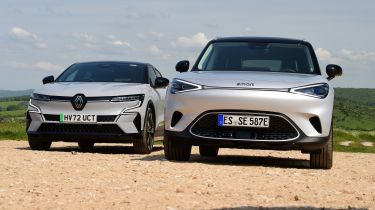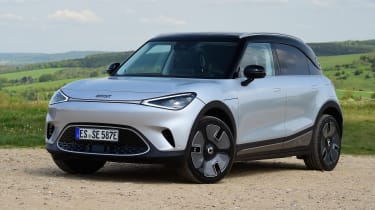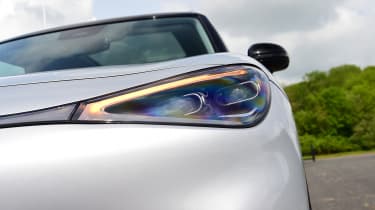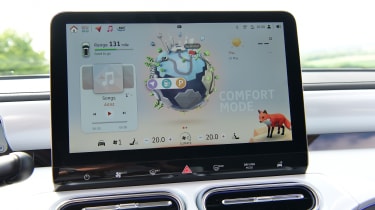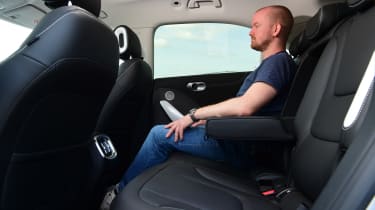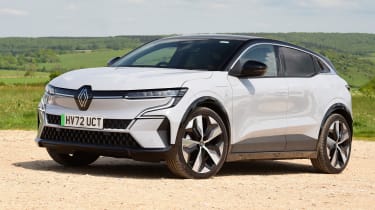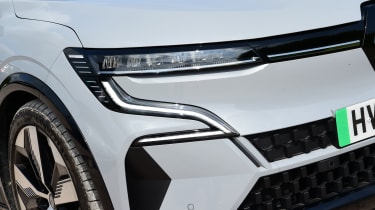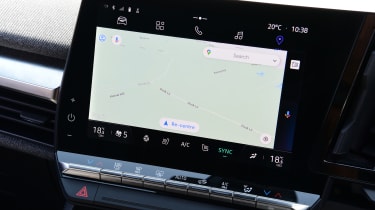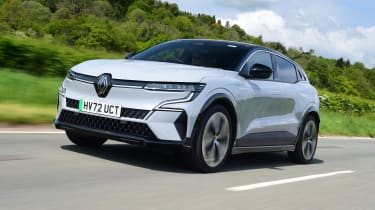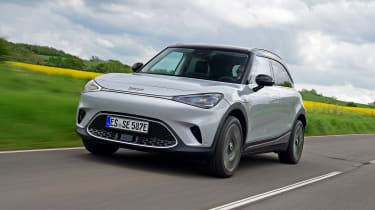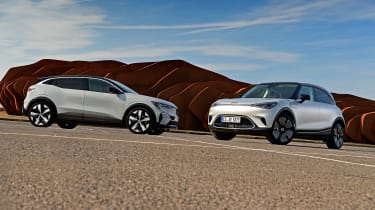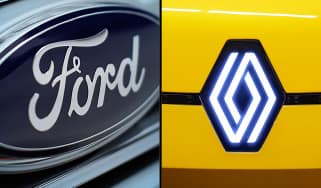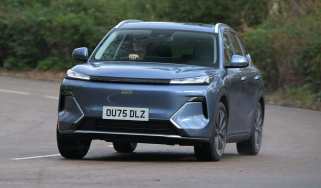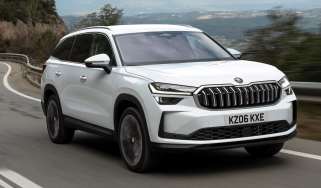Smart #1 vs Renault Megane E-Tech: 2023 twin test review
The Smart #1 marks the dawn of a new era for the former city car maker. Does it have the measure of the Renault Megane?
Hear the words ‘Smart car’ and you’re probably going to picture a tiny two-seater that’s perfectly suited to the city. But now the brand is expanding its horizons, which means expanding its cars. Step forward the Smart #1, a new compact SUV that offers space for five and a much broader appeal as a result. Some things don’t change, though; the brand still pitches itself as one for the young and style-conscious.
As you’d expect for an entirely new car in 2023, Smart has gone all-electric with its newcomer, which puts it up against some pretty strong competition, among which is the Renault Megane E-Tech, but there’s genuine substance there, too. So does the Smart have the panache and ability to compete with one of the most desirable family EVs around?
| Smart #1 Premium | Renault Megane E-Tech Techno | |
| Price: | £38,950 | £39,495 |
| Powertrain: | 1x e-motor, 62kWh battery, rear-wheel drive, 268bhp | 1x e-motor, 60kWh battery, front-wheel drive, 217bhp |
| 0-62mph: | 6.7 seconds | 7.5 seconds |
| Test efficiency: | 3.8mi/kWh | 3.7mi/kWh |
| Test range: | 273 miles | 280 miles |
Smart #1
A fresh start for Smart presents an opportunity to transform both the brand’s image and the electric family car segment. Initial prices are keen; at £38,905, even this high-spec Premium trim undercuts many rivals.
Tech highlights
The charming Smart ForTwo wasn’t for everyone, but there was no doubting its ingenious design. For the #1, Smart says this clever use of space remains, with the all-electric newcomer adopting a compact SUV body, with all the components laid out similarly to many EVs that have come before it.
Used - available now

2022 BMW
3 Series
78,000 milesAutomaticPetrol2.0L
Cash £17,000
2014 Toyota
Auris
60,000 milesManualPetrol1.6L
Cash £6,000
2022 Volvo
V90
88,000 milesAutomaticPetrol2.0L
Cash £18,250
2020 Volvo
V90
77,000 milesAutomaticPetrol2.0L
Cash £16,650The Geely-derived SEA platform mounts its single electric motor on the rear axle, for rear-wheel drive. With 268bhp and 343Nm, there’s an impressive amount of muscle on tap.
Energy is supplied by a 62kWh battery, and rapid 150kW charging gives a 10-80 per cent top-up in less than 30 minutes. An official kerb weight of 1,788kg means the #1 sits towards the heavier end of the segment, though.
Safety: The #1 gained a five-star rating in its 2022 Euro NCAP safety assessments, with a 96 per cent score in the Adult Occupant category its greatest highlight. It also bagged an 88 per cent score in the Safety Assist category, but here we found that much of the clever driver assistance tech leaves a little to be desired in its execution on the road.
The lane-keep assist system is intrusive in everyday driving. While there’s no doubting the tech works, its implementation means that it can sometimes be annoying when it cuts in; overtake a cyclist or a stationary bus, for example, and the system will tug the wheel, sending you back into their path. However, it’s not quite as irritating as the over-active attention warning function, which also seems hit and miss.
On the road
Unfortunately, the Smart falls a little flat when it comes to the way it drives. It isn’t fundamentally flawed – in fact it has plenty of potential – but some areas need work.
Around town: Typical of other EVs, the Smart uses motor regeneration to slow the car while recovering energy. However, there’s a delay between lifting off the accelerator pedal and the regen engaging, so it’s hard to drive smoothly.
It’s most obvious in the top ‘one-pedal’ setting, where the most aggressive regeneration slows the car noticeably after a brief pause when lifting off the accelerator. The ride is fidgety around town, although this isn’t unusual for hefty EVs fitted with large wheels.
A & B-roads: That fidget feels more at odds in this car than in many rivals, because the springs and dampers often feel out of sync with one another. The upshot of this is that sharper bumps are dealt with very harshly. It’s more of a concern in corners, where the body has a tendency to roll quickly, and then bounce once it’s fully loaded up.
When you consider the Smart’s performance, the relative lack of control is a little more of an issue. This is a quick car – a 0-62mph time of 6.7 seconds matches that of the hot Ford Puma ST – yet the suspension feels unprepared to handle that speed on anything other than a straight road.
It seems all too easy for EV manufacturers to slap hot-hatch power outputs into anything, and in the Smart in particular, this doesn’t appear to be a great idea.
Motorway: The one plus to the Smart’s soft suspension and significant body weight is that it feels fairly soothing at motorway speeds.
Ownership
The cabin is undoubtedly the #1’s strongest suit, both in terms of aesthetic appeal and practicality. The dashboard design makes use of textured materials, 64-colour ambient lighting and, in this Premium trim, white plastic, to give a fresh, modern and minimalist environment.
Influence from co-parent brand Mercedes is obvious, as the Smart’s cubby lids operate with the quality typical of the German marque, while the physical buttons on the steering wheel all have a pleasingly tactile feel. Given the compact SUV body style, you sit quite high, and when combined with a large amount of glass all round it means that visibility is great.
Despite using modest materials, Smart has cleverly created an upmarket ambience, but the Beats sound system doesn’t really live up to the high-end ambitions. For an uprated speaker set-up, it’s underwhelming.
As standard, the #1 gets a three-year, unlimited-mileage warranty and an eight-year/125,000-mile cover package for the high-voltage battery. If you keep up the manufacturer’s service schedule with an approved service centre, breakdown cover will cover you for up to eight years or 100,000 miles.
Thanks to a two per cent Benefit-in-Kind tax banding, the Smart is very cheap to run for company car users. Higher-rate taxpayers will face deductions of only £311 each year. Such low costs also apply to the Megane, though.
Storage: The high centre console has three separate lidded bins. The front pocket holds a smartphone, while the middle lid reveals a pair of cupholders. The largest space is at the back, where there’s a long, deep area for storing items out of sight. Keeping charging cables separate from luggage is useful if you have a packed boot, and the #1 has extra space under the bonnet for that.
Practicality
Considering that the #1’s footprint is similar to a VW Golf’s, the room it offers for both occupants and their luggage is very impressive.
Rear Space: In terms of knee, head and elbow room, there’s much more here than in the Renault. The floor is flat, so there’s plenty of foot space even with three passengers. The one small downside is that the backrests are quite firm.
Boot: At 411 litres, the #1’s boot is a reasonable size on paper, but it’s the neat, square shape of the load area and its wide opening that makes it more useful than that number implies.
Fold the back seats flat, and the volume grows to 976 litres – although that figure measures only to the window line, rather than the roof, so it’s still fairly generous. There’s also a decent amount of extra storage under the false boot floor.
What to buy?
Which configuration we’d choose
- Powertrain: The bulk of the Smart #1 range comes with the same single 268bhp motor, but the hot Brabus model gets a second motor for a total power output of 422bhp. All cars have the same 66kWh battery.
- Trim: From launch, buyers can choose from four trim levels. These start with the Pro+ at £35,950, then step up to the Premium (£38,950) and the Launch Edition. The range tops out with the Brabus. The Premium model adds a heat pump and better control electronics over the base car, which boosts its range by 13 miles.
- Our choice: The Premium and its heat pump will be very useful in the UK.
Renault Megane E-Tech
Our test Megane is a mid-range version, but Techno trim is still very generously equipped. At £39,495, it’s more expensive than the Smart to buy outright, but as we’ll cover later, Renault’s consistently competitive finance deals mean it’s more affordable to purchase through other means.
Tech highlights
Renault and Smart have some history: a joint venture between the two firms created not only the outgoing ForTwo and ForFour models, but also the third-generation Twingo.
While Smart’s rear-motor layout is the same as its previous city car models, the Megane’s CMF-EV platform (which is shared with the Nissan Ariya) uses a front-motor, front-wheel drive layout. At 217bhp and 300Nm, it’s not quite as potent as its rival’s set-up, but it also has much less weight to lug around; the Renault’s 1,685kg kerbweight is 103kg less than the #1’s. Considering the 60kWh battery is only marginally smaller than the Smart’s unit, that’s a significant difference in mass. However, the Smart is rated to tow a 1,600kg trailer, which is much higher than the 900kg rating of the Renault.
At 4,200mm long, the Megane is fairly compact; in fact, it’s 159mm shorter than the fourth-generation combustion powered Mégane, and only very slightly wider. It has grown 60mm taller than its predecessor, but it’s still closer to a hatchback body style than the full SUV that Smart has created.
Safety: As with the Smart, the Megane E-Tech was assessed by Euro NCAP in 2022, and it also earned a five-star rating. Its category scores were slightly lower than the Smart’s, however, although we found its safety-assist systems to be less intrusive during our test.
On the road
Across the board, the Renault feels much more polished to drive than its rival. It’s one of the sportier models to drive in its segment.
Around town: It’s clear that the Megane is much easier to drive smoothly than the Smart.
The brakes are better calibrated, with a more pleasant transition between motor regen and mechanical deceleration. Paddles behind the wheel allow the driver to adjust the rate at which the car slows down on the fly.
The combination of 20-inch alloy wheels and reasonably firm suspension means that the Megane can feel fidgety over small bumps, though, so it’s no better than the #1 in this respect.
A & B-roads: The Renault’s chassis has been tuned to deliver a much firmer response than the Smart’s. While it’s by no means perfect, it feels like a significantly more coherent driving experience as a whole. With less mass to move around, the Megane feels more agile.
Whether you’re having fun or making an evasive manoeuvre, its stable, slightly nose-heavy balance is far more reassuring than its rival’s. The steering is much lighter, but it’s precise, and adds to the impression of agility.
The Megane can’t quite keep pace with the Smart in a straight line, but its 7.5-second 0-62mph time is plenty for a family hatchback. Get too keen with the throttle when pulling out of a junction and it’s possible to spin up the front tyres.
Motorway: That bumpy ride in town goes away at speed, and the Megane makes for an accomplished long-distance cruiser. Road and wind noise are acceptable, and despite light steering weight, it doesn’t feel flighty.
Ownership
Renault's interior design has taken a big step forward in a very short period of time, with most of its cars ranking towards the top of their respective segments for cabin quality. The Megane E-Tech maintains that trend.
While the large 12.3-inch driver’s display and curving nine-inch touchscreen look a little generic in their layout, the rest of the design is uncluttered and neatly arranged. The expanse of fabric across the dash feels more expensive than some squishy plastics, while the slightly squared-off steering wheel feels great to hold. The drive selector is mounted high on the steering column, so it’s hard to accidentally confuse it with the wiper stalk.
The driving position is much lower than the perched set-up in the Smart. While it feels sportier, it only highlights one of the few minus points of the Megane’s cabin: poor visibility.
That slim glasshouse looks dramatic from the outside, but it means that the view out isn’t great – particularly over the shoulder and directly behind, where a large blind spot is created by the small rear screen and large C-pillars.
Smart didn’t feature in our 2023 Driver Power satisfaction survey for manufacturers, but it would be difficult for it to perform worse than Renault. Of the 32 brands surveyed, the French maker finished 29th ahead of only MG, Fiat and Audi. There were no disastrous scores in any particular category, but even fewer outstanding marks.
Storage: The feeling of quality is highlighted by small details throughout the Megane’s cabin. The door bins, for example, are fully carpeted, so items won’t rattle around while you’re driving.
There’s loads of space in the deep centre console, too, although there’s only one large cupholder. The smartphone charging pad is high up and angled backward, so while there’s a tab that’s designed to hold a device in place, it doesn’t feel very secure.
Practicality
In isolation the Megane E-Tech feels like a reasonably spacious hatchback, but Smart’s SUV has it beaten here.
Rear Space: Legroom is the Renault’s clearest disadvantage, offering roughly 80mm less than the Smart. There’s less to separate them in terms of headroom, but the #1 still has a small advantage. A high floor relative to the seat squab means the Renault’s bench isn’t great for under-thigh support, and there isn’t much foot space under the front seats, either.
Boot: A 440-litre volume sounds great, but the Megane’s boot is awkwardly shaped. The main problem is a load lip that’s higher than in many SUVs, so you have to haul items up before dropping them into the low floor on the other side. Fold the back seats, and the volume grows to 1,364 litres, but there’s a big step in the load floor.
What to buy?
Which configuration we’d choose
- Powertrains: There’s just the one motor option for the Megane line-up, but the 217bhp front-driven unit is a very solid performer. Unlike the Smart – or previous combustion-powered Meganes – there’s no high- performance variant in the range.
- Trim: The Megane line-up kicks off with the £36,995 Equilibre and tops out with the £41,995 Iconic. Between them sit Techno and Techno+. The Techno model adds built-in Google Navigation, drive modes and extra ambient lighting options, while Techno+ adds a heat pump, which is an essential extra.
- Our choice: The Techno+ gives the best balance between luxuries and useful tech.
Results
Which car comes out on top?
Winner: Renault Megane E-Tech
Renault has strong EV form with the Zoe, but the Megane offers even greater versatility in a much more desirable package. In terms of interior design and infotainment tech, few rivals come close.
Yet Renault has backed that up with a car that offers strong performance and keen handling, as well as the brand’s always-competitive finance deals. It beats the Smart here, but with a little more rear-seat space and a slightly longer real-world range, the Megane would be a formidable test for any rival.
| Pros | Cons |
| Keen handling | Firm ride |
| Great refinement | Underwhelming range |
| Brilliant infotainment tech | Poor rear visibility |
| Strong equipment levels | Tighter in the rear |
Runner up: Smart #1
Based on the specs, it’s hard to see how the Smart #1 couldn’t walk this contest. It has loads of power, decent efficiency and a spacious cabin, all at a tempting price.
However, the disappointments linger behind the wheel. The suspension feels crude – especially when considering the power it has to handle – and the safety systems are irritating. With tweaks to the drive, infotainment and finance figures, the Smart could take on the class leaders. As it is, it’s an also-ran.
| Pros | Cons |
| Strong performance | Ride quality |
| Spacious cabin | Fussy infotainment system |
| Impressive efficiency | Brake calibration |
| Practical storage | Intrusive assist systems |
Rivals and other options
The Megane E-Tech wins our twin test, but what else is out there?
- Same class: Jeep Avenger
- Same money: MG4
- Used: Audi A4 e-tron
- Used: Kia Soul EV
- Coming soon: Volvo EX30
The great debate
What the Auto Express test team would do…
Sean Carson, associate editor: “The future of Renault’s hot models will be under the Alpine banner. We’ve had no confirmation that a fast Megane is on the horizon, but we think this platform would be a solid base from which to build a sharp-handling, exciting electric hot hatch.”
John Mcllroy, deputy editor: “Renault's finance deals have been a big selling point for a long time, and they helped the Megane first across the line here. If you’re happy to go for a shorter PCP – and are able to stump up a big five-figure deposit – then there’s zero per cent finance on a two-year deal.”
Dawn Grant, picture editor: “There's definitely a great car somewhere inside the #1, but we’re not convinced that it’s shown itself just yet. We hope that some updates can address its flaws (none of them seems impossible to fix), because we’re convinced that there’s a lot of potential bursting to get out.”
Steve Fowler, editor-in-chief: “A complete change of tactics from Smart is a risky move – we haven’t seen many ForTwos or ForFours in the UK in recent years, but they have been very popular in many other European countries. At least its previous range offered something unique within a very busy market.”
Dean Gibson, senior test editor: “We’ve criticised Smart’s lane-assist tech here, but it’s far from the only maker to offer an over-intrusive system. Many of these systems can be pretty unpleasant to live with every day, and some are more complicated than others to switch off.”
Which would you buy? Let us know in the comments section below…
Specs and prices
| Smart #1 Premium | Renault Megane e-Tech EV60 Techno | |
| Petrol, diesel or electric? | Electric | Electric |
| M/kWh | 3.8 | 3.7 |
| Electricity cost (£) | 0.34 | 0.34 |
| P11D value | £38,895 | £39,440 |
| Fill up | 21.08 | 20.40 |
| On the road price/total as tested | £38,950/£38,950 | £39,495/£40,445 |
| Residual value (after 3yrs/36,000) | £20,527 (52.7%) | £21,876 (55.4%) |
| Depreciation | £18,423 | £17,619 |
| Annual tax liability std / higher rate | £155.58/£311.20 | £158/£315.50 |
| Annual fuel. cost (10k / 20k miles) | £895 (£1,789) | £919 (£1,838) |
| Ins. group / quote / VED | 30/£598/£0 | 27/£570/£0 |
| Service costs (3 years) | £0 | £0 |
| Length/wheelbase | 4,270/2,750mm | 4,200/2,685mm |
| Height/width | 1,636/1,822mm | 1,505/1,860mm |
| Powertrain | Single electric motor/lithium-ion battery | Front e-motor/lithium-ion battery |
| Peak power | 268 bhp | 217 bhp |
| Peak torque | 343 Nm | 300 Nm |
| Transmission | Single-speed auto/rwd | Single-speed/fwd |
| Battery capacity / usable | 62/62kWh | 60/60kWh |
| Boot capacity (seats up / down) | 411/976 litres | 440/1,364 litres |
| Kerbweight / payload / towing weight | 1,788/1,600kg | 1,685/900kg |
| Turning circle | 11.0 metres | 10.4 metres |
| Basic warranty / recovery | 3 yrs (unlimited)/3 yrs | 5 yrs (100k)/3yrs |
| Driver Power manufacturer position | N/A | 29th |
| Euro NCAP: Adult / child / ped. / assist / stars | 96/89/71/88/5 (2022) | 85/88/65/79/5 (2022) |
| 0-62mph / top speed | 6.7 seconds/130mph | 7.5 seconds/99mph |
| Claimed range (WLTP) | 273 miles | 280 miles |
| Charging capability | 7.4/150kW | 7.4/130kW |
| Charging time | <7hrs 30mins/<30mins 10-80% | 9h 15mins/30 mins 15%-80% |
| Actual/claimed CO2/tax bracket | 0/0g/km | 0/0g/km |
| Number of airbags/Isofix points | Seven/two | Seven/three |
| Parking sensors/camera | F&r/360 | F&r/yes |
| Lane-keep assist/blindspot/AEB | Yes/yes/yes | Yes/yes/yes |
| Climate control/adaptive cruise ctrl | Yes/yes | Yes/yes |
| Leather/heated seats | Yes/f&r | Part/f&r |
| Metallic paint/LED lights | £0/yes | £650/yes |
| Keyless entry & go/powered tailgate | Yes/yes | Yes/no |
| Sat-nav/digital dashboard/USBs | Yes/yes/six | Yes/yes/four |
| Online services/wireless charging | Yes/yes | Yes/yes |
| Apple CarPlay/Android Auto | Yes/Yes | Yes/Yes |

